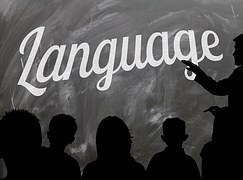
What is a language?
A language is a system of communication used by a specific community. Nearly everyone speaks (or signs) at least one language. Speaking only one language, or monolingualism, is common in many parts of the English-speaking world such as North America, the UK and Australia. However, a much larger number of the world’s population live in countries where multiple languages are spoken throughout the day. For example people may have a home, community, religious, colonial, academic and/or business language. A lot of the challenges faced by monolingual learners of secondary languages is a result of two factors: little exposure to second or third languages in childhood, and a poor education in grammar instruction.
Are all languages similar?
Languages are similar in that they enable humans to communicate with each other. All languages are spoken (or signed) but not all languages are written. Languages change over generations so that a modern version of a language may be very different than an older version although the degree to which languages change depends on many factors and some people can read texts that are hundreds of years old with little difficulty.
Is my target language related to English?
Languages are grouped first by family, then group and branch similarly to plants or animals. For example, English is a member of the Indo-European language family that includes most languages spoken throughout Europe, India and Iran. Furthermore, there are nine sub-groupings one of which is the Germanic family. English belongs to the West Germanic branch which includes closely related languages such as Dutch and German. Spanish on the other hand belongs to a different subgrouping called Italic, of which the majority of the languages such as Spanish, Italian, Portuguese are referred to as Romance languages.
What are the similarities between English and my target language?
German and English share some similar grammar structures and vocabulary that go back several hundred years. Spanish and English share a lot of similar vocabulary owing to the fact that English borrowed many Latin words during the Middle Ages. The grammar between English and Spanish can, at times, be quite different.
How do people learn a language?
The most common and natural way to learn language is as a young child exposed to the language being used in your household and community. To learn to read and write you generally receive formal instruction. The second way to learn a language is through formal instruction. This is the way most people learn a second language as adolescents and adults. Sometimes the two methods can be combined whereas for example someone goes and lives abroad for a number of years and learns to speak by communicating with native speakers while simultaneously taking formal lessons. If you are unable to live among people speaking your target language, re-creating an immersion environment as much as possible is suggested.
When is the best time of day to learn?
This varies a lot. Some people learn best first thing in the morning when their mind is fresh while others thrive at the end of the day. Furthermore, people have different learning styles. Some people enjoy having background music while others need total silence. Experiment and see when and in what type of environment you learn best.
What is involved?
When developing a new skill such as a language it is important to revisit concepts and vocabulary repeatedly throughout the day in small increments of 10-20 minutes. Just like exercising your body, do a 2-3 minute warm-up by reviewing some older material and then challenge yourself. By consistently exposing your brain pathways to new vocabulary, sentence structure and grammar the language will start to feel more natural and less foreign.
How can I be successful?
Like many things in life, confidence and consistent effort are the key to your success! Making mistakes is a natural and necessary part of learning any language including your first language. Self-defeating thoughts, or berating yourself if you don’t do your homework is not helpful. Set realistic goals and stick to them. Also, remember to celebrate the milestones along the way.
What should my expectations be?
It is important to set realistic goals while learning a new language. Track your short, medium and long-term goals. With regular study, you can expect to hold a basic conversation within a few weeks and a more complex conversation within 3 months. By 6-9 months you should be ready to face most daily situations and express yourself in the present, future and past tenses. This level is called “conversationally fluent”. For native fluency the learning never ends!
Is it worth the effort?
Definitely! There are numerous benefits associated with learning an additional language. The obvious one is that you are able to communicate with new people in your personal or professional life. Secondly, you are also able to appreciate a new culture on a deeper level. Language learning is also good for your brain development and maintenance. The best news is the more languages you learn the easier it gets!







